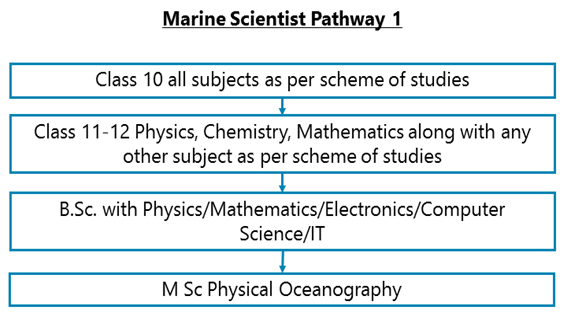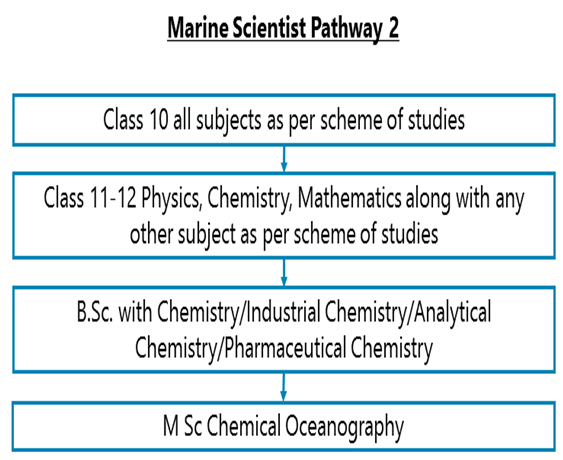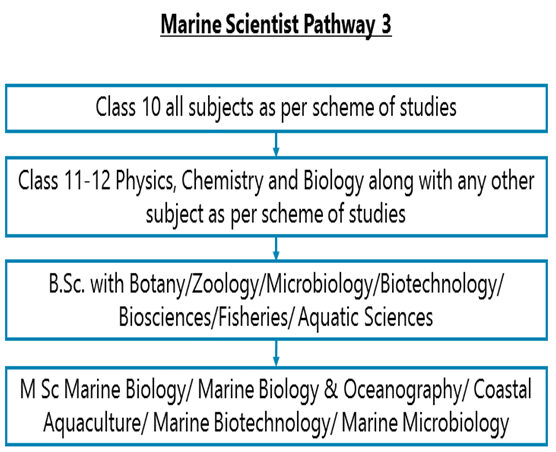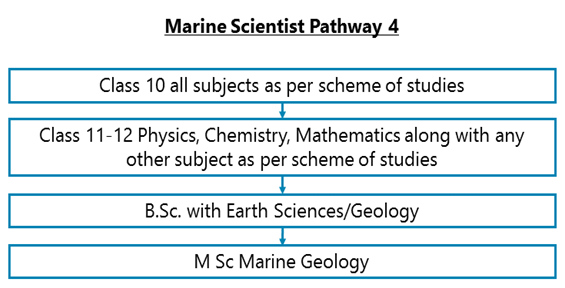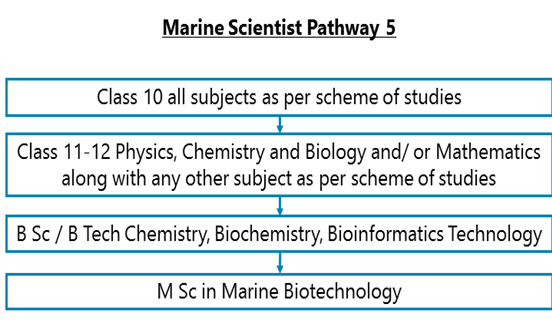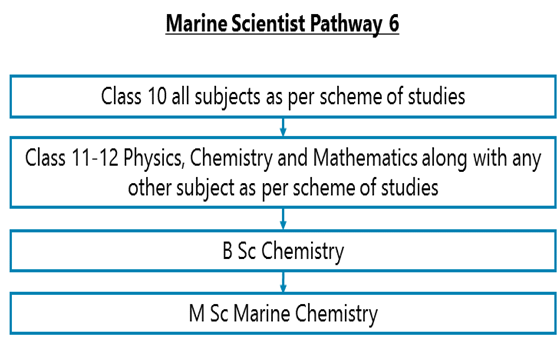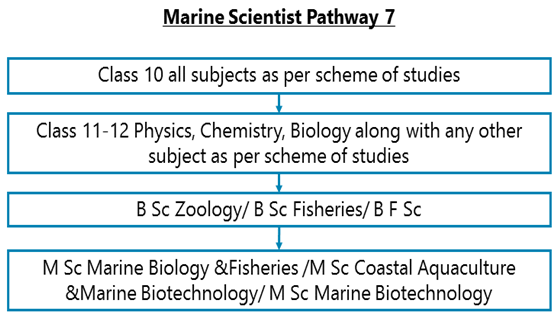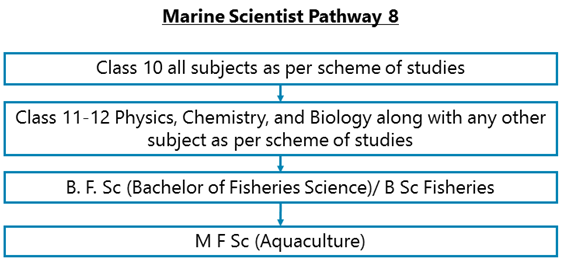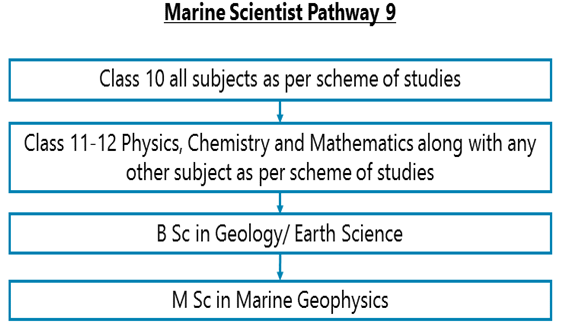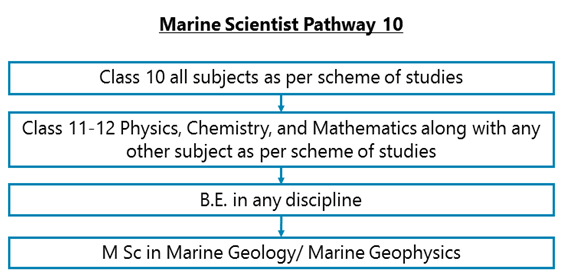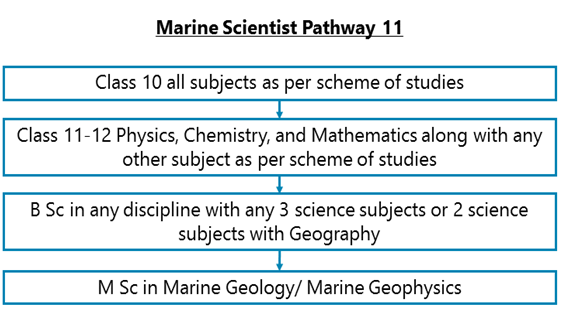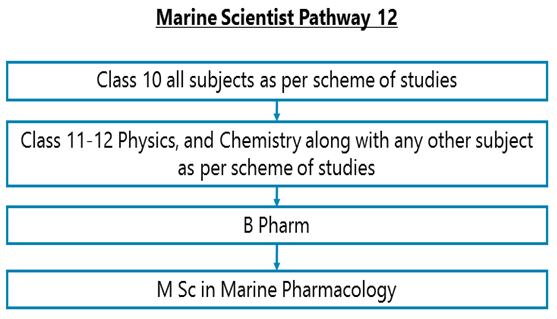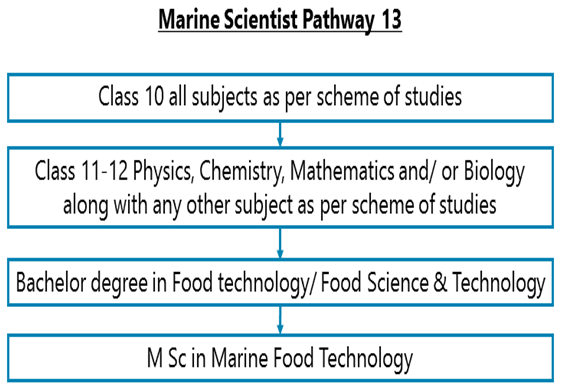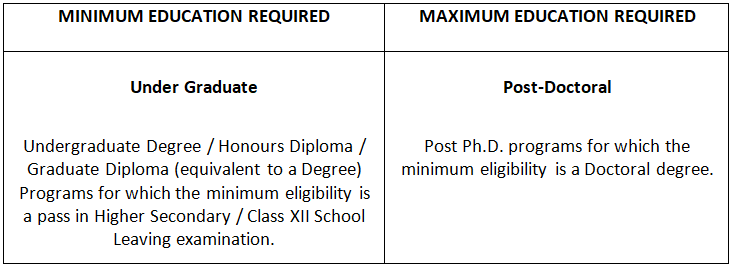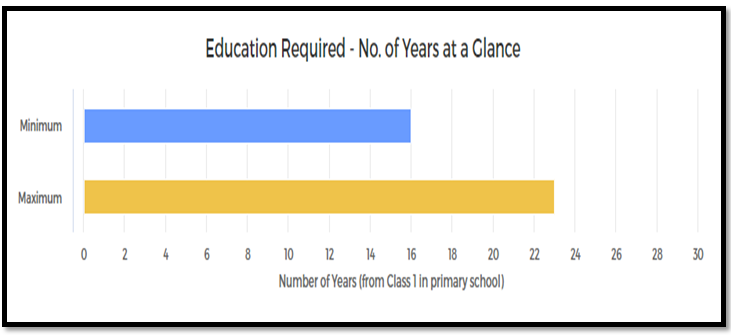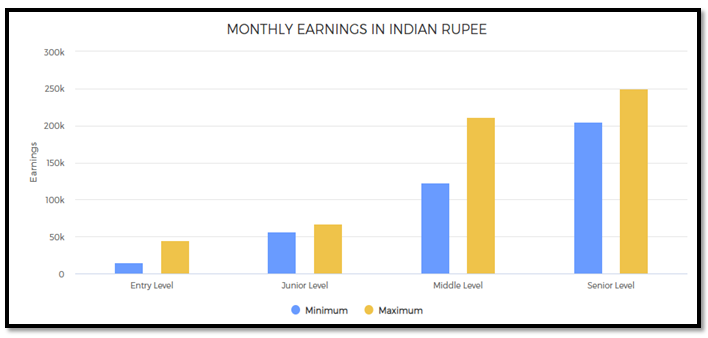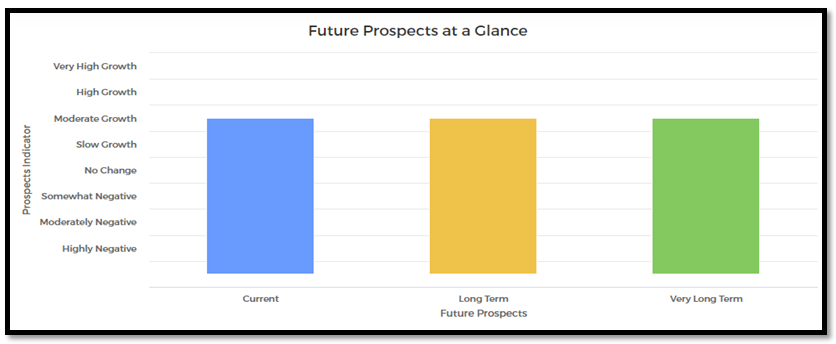Marine Scientist
Entry Level Qualification
Post Graduate
Career Fields
Education & Teaching, Mathematics & Science
For Specially Abled






Career Entrance Exam
About Career
PARTICULARS | DESCRIPTION |
Name | Marine Scientists |
Purpose | Research & Studies Animal Life, Plants, The Land |
Career Field | Mathematics & Science |
Required Entrance Exam | No Entrance Exam |
Average Salary | Rs. Per Year |
Companies For You | National Institute of Oceanography (NIO), National Institute of ocean Technology (NIOT) & Many More |
Who is Eligible | Post Graduate |
1. Marine Scientists study the physical, chemical and biological aspects of Earth’s hydrosphere specifically the ones relating to the combined water volume above the surface of the planet (oceans/ seas) including inland aquatic ecosystems like lakes, reservoirs, ponds, rivers, springs, streams, and wetlands. The study of inland water systems is specifically called ‘Limnology’ (an ecosystem is a biological community of interacting organisms and their physical environment).
2. Marine Science involves studying of the wildlife of oceans, rivers, lakes, seas, etc., the microbes found in these environments, the interactions between living / non-living components of these environments, geological aspects of the water systems, the biology of certain water animals, disease pathologies of animals found in these locations, deriving natural products from these resources for creating medicines for the treatment of human diseases, etc.
3. All such professionals practicing in different varied areas under marine science are collectively called Marine Scientists. They can be biologists, pharmacologists, geologists, chemists, archaeologists, biotechnologists, ecologists, aqua culturists, conservationists, etc.
4. Marine Biologists study the biology of individual marine organisms. Marine Pharmacologists work towards developing new drugs for human diseases from marine organisms such as invertebrates that include sponges, soft corals, sea fans, sea hares, nudibranchs, bryozoans, and tunicates or other sources. Marine Geologists study the origin & evolution of the global oceans, the history of the earth’s climate, the earth’s natural resources and their exploitation.
5. Marine Chemists study phenomena such as seawater properties and its changes, geochemical cycles, ocean acidification. They also research upon increase/decrease of water pH/ oxygen levels, calcium deposits in skeletons of marine animals, etc.
6. Some chemical changes in the hydro environment which affect planktonic organisms like pteropods, coccolithophorids, and foraminifera are also of great interest to Marine chemists. These organisms are all very important in the food chain.
7. The current rate of oceanic chemistry change seems to be unprecedented in Earth's geological history, making it unclear how well marine ecosystems will adapt to the shifting conditions of the near future.
8. Marine Ecologists study, manage and seek to conserve these ecosystems using a landscape perspective, by explicitly examining connections between an aquatic ecosystem, its watershed, and coasts. A watershed separates neighboring drainage basins.
9. Aquaculture, which is also known as aquafarming, is the farming of fish, crustaceans, mollusks, aquatic plants, algae, and other organisms. It involves cultivating freshwater and saltwater populations under controlled conditions. Contrarily, commercial fishing is the harvesting of wild fish from natural habitats. Aqua medicine experts focus on methods of treating diseases of marine animals.
10. Marine Biotechnologists focus on the application of marine organisms like algae and sponges in biotechnological processes. They have advanced skills in genetic, biotechnological and molecular biological techniques to solve specific tasks in industry and public administration such as in the food industry, brewing industry, pharmaceuticals industry, production of fine chemicals, renewable energy, etc.
Key Roles and Responsibilities
As a Marine Scientist you will be responsible for one or more of the following roles and associated tasks as well:
1. You will study marine animals/ plants/ microbes in their natural habitats, assessing the effects of environmental changes and industry on them, interpreting findings & recommending alternative operating conditions for industry.
2. You will study marine flora and fauna to craft new treatment modalities (methods) for human diseases using sources including invertebrates like sponges, soft corals, sea fans, sea hares, nudibranchs, bryozoans, & tunicates and to evaluate effects of new drugs, parasites, & microorganisms at various levels.
3. You will study underwater physical and chemical characteristics or phenomena such as seawater properties and its changes, geochemical cycles, ocean acidification, increase/decrease of water pH/ oxygen levels, calcium deposits in skeletons of marine animals, chemical changes in the hydro environment, etc.
4. You will assess the properties of water in oceans or seas to determine suitability for initiating construction works, building of oil rigs or participate in archaeological research at underwater sites of historical value.
5. You will collect, synthesize, analyze, manage, and report scientific data, such as emission measurements, atmospheric monitoring measurements, biological/ mineralogical information, or water samples.
6. You will organize, design and conduct technical assaying and scientific experiments with live / non-live biological, aquatic, aerial specimens in controlled (laboratory) or natural surroundings.
7. You will analyze data to determine validity, quality, & scientific significance or to interpret correlations between human activities and their effects.
8. You will prepare charts or graphs from data samples, make computational simulations, providing summary information on the relevance of the data (collected/ empirical).
9. You will plan or develop research models, using knowledge of mathematical and statistical concepts.
10. You will disseminate information by writing reports & scientific papers or journal articles, and by making presentations/ giving talks for schools, clubs, interest groups and park interpretive programs or in seminars, collegiums, conferences around the world.
11. You will provide scientific or technical guidance, support, coordination, or oversight to governmental agencies, academic programs, industry, or the public.
12. You will independently conduct regular applied secondary research (reading/ examining existing literature and published journal articles) on relevant topics to obtain & review technical data and standards, find identical/ similar experiments or results, and may also be responsible for communicating complex analyses clearly & succinctly to a non-technical audience.
Career Entry Pathway
Class 10 all subjects as per scheme of studies – Class 11-12 Physics, Chemistry, and Mathematics along with any other subject as per scheme of studies - B.Sc. with Physics/Mathematics/Electronics/Computer Science/IT – M Sc Physical Oceanography
After completing Class 11-12 Physics, Chemistry, and Mathematics along with any other subject as per scheme of studies, you can go for B.Sc. with Physics/Mathematics/Electronics/Computer Science/IT or similar. Thereafter go for M Sc Physical Oceanography. You may go for higher Doctoral studies (PhD) too after your post-graduation.
Class 10 all subjects as per scheme of studies – Class 11-12 Physics, Chemistry, and Mathematics along with any other subject as per scheme of studies - B.Sc. with Chemistry/Industrial Chemistry/Analytical Chemistry/Pharmaceutical Chemistry – M Sc Chemical Oceanography
After completing Class 11-12 Physics, Chemistry, and Mathematics along with any other subject as per scheme of studies, you can go for B.Sc. with Chemistry/Industrial Chemistry/Analytical Chemistry/Pharmaceutical Chemistry or similar. Thereafter go for M Sc Chemical Oceanography. You may go for higher Doctoral studies (PhD) too after your post-graduation.
Class 10 all subjects as per scheme of studies – Class 11-12 Physics, Chemistry, and Biology along with any other subject as per scheme of studies - B.Sc. with Botany/Zoology/Microbiology/Biotechnology/ Biosciences/Fisheries/ Aquatic Sciences – M Sc Marine Biology/ Marine Biology & Oceanography/ Coastal Aquaculture/ Marine Biotechnology/ Marine Microbiology
After completing Class 11-12 Physics, Chemistry, and Biology along with any other subject as per scheme of studies, you can go for B.Sc. with Botany/Zoology/Microbiology/Biotechnology/ Biosciences/Fisheries (B F Sc-Bachelor of Fisheries Science) / Aquatic Sciences or similar. Thereafter pursue M Sc Marine Biology/ Marine Biology & Oceanography/ Coastal Aquaculture/ Marine Biotechnology/ Marine Microbiology. You may go for higher Doctoral studies (PhD) too after your post-graduation.
Class 10 all subjects as per scheme of studies – Class 11-12 Physics, Chemistry, and Mathematics along with any other subject as per scheme of studies - B.Sc. with Earth Sciences/Geology – M Sc Marine Geology
After completing Class 11-12 Physics, Chemistry, and Mathematics along with any other subject as per scheme of studies, you can go for B.Sc. with Earth Sciences/Geology. Thereafter you can go for M Sc Marine Geology. You may go for higher Doctoral studies (PhD) too after your post-graduation.
Class 10 all subjects as per scheme of studies – Class 11-12 Physics, Chemistry, and Mathematics along with any other subject as per scheme of studies – B Sc / B Tech Chemistry, Biochemistry, Bioinformatics Technology – M Sc in Marine Biotechnology
After completing Class 11-12 Physics, Chemistry, and Mathematics along with any other subject as per scheme of studies, you can go for an Undergraduate Degree (B Sc/ B Tech) in Biotechnology, Chemistry, Bioinformatics technology, Biochemistry, Agriculture or similar. Then go for M Sc in Marine Biotechnology. You may go for higher Doctoral studies (PhD) too after your post-graduation.
Class 10 all subjects as per scheme of studies – Class 11-12 Physics, Chemistry, and Mathematics along with any other subject as per scheme of studies – B Sc Chemistry – M Sc Marine Chemistry
After completing Class 11-12 Physics, Chemistry, and Mathematics along with any other subject as per scheme of studies, go for a B Sc in Chemistry and then an M.Sc in Marine Chemistry.
Class 10 all subjects as per scheme of studies – Class 11-12 Physics, Chemistry, and Biology along with any other subject as per scheme of studies – Bachrlor's – Master's in Marine Biology & Fisheries /Coastal Aquaculture & Marine Biotechnology/ Marine Biotechnology
After completing Class 11-12 Physics, Chemistry, and Biology along with any other subject as per scheme of studies, you can go for B Sc Zoology/ B Sc Fisheries/ B F Sc (Bachelor of Fisheries Science). Thereafter, you can go for M Sc in Marine Biology & Fisheries /M Sc in Coastal Aquaculture & Marine Biotechnology/ M Sc in Marine Biotechnology. You may go for higher Doctoral studies (PhD) too after your post-graduation.
Class 10 all subjects as per scheme of studies – Class 11-12 Physics, Chemistry, and Biology/ Mathematics along with any other subject as per scheme of studies– B. F. Sc – M F Sc (Aquaculture)
After completing Class 11-12 Physics, Chemistry, and Biology/ Mathematics along with any other subject as per scheme of studies, you can go for B. F. Sc (Bachelor of Fisheries Science)/ B Sc Fisheries. Then pursue M F Sc (Aquaculture).You may go for higher Doctoral studies (PhD) too after your post-graduation.
Class 10 all subjects as per scheme of studies – Class 11-12 Physics, Chemistry, and Mathematics along with any other subject as per scheme of studies – B Sc in Geology/ Earth Science – M Sc in Marine Geophysics
After completing Class 11-12 Physics, Chemistry, and Mathematics along with any other subject as per scheme of studies, you can go for B Sc in Geology/ Earth Science. Then pursue M Sc in Marine Geophysics. You may go for higher Doctoral studies (PhD) too after your post-graduation.
Class 10 all subjects as per scheme of studies – Class 11-12 Physics, Chemistry, and Mathematics along with any other subject as per scheme of studies – B.E. in any discipline – M Sc in Marine Geology/ Marine Geophysics
After completing Class 11-12 Physics, Chemistry, and Mathematics along with any other subject as per scheme of studies, you can go for BE in any discipline. Then pursue M Sc in Marine Geology/ Marine Geophysics. You may go for higher Doctoral studies (PhD) too after your post-graduation.
Class 10 all subjects as per scheme of studies – Class 11-12 Physics, Chemistry, and Mathematics/Biology along with any other subject as per scheme of studies – B Sc in any discipline – M Sc in Marine Geology/ Marine Geophysics
After completing Class 11-12 Physics, Chemistry, and Mathematics/Biology along with any other subject as per scheme of studies, you can go for B Sc in any discipline with any 3 science subjects or 2 science subjects with Geography. Then pursue M Sc in Marine Geology/ Marine Geophysics. You may go for higher Doctoral studies (PhD) too after your post-graduation.
Class 10 all subjects as per scheme of studies – Class 11-12 Physics, Chemistry, and Mathematics/Biology along with any other subject as per scheme of studies – B Pharm – M Sc in Marine Pharmacology
After completing Class 11-12 Physics, Chemistry, and Mathematics/Biology along with any other subject as per scheme of studies, you can go for a B Pharm. degree (Bachelor of Pharmacy). Then pursue a M Sc in Marine Pharmacology. You may go for higher Doctoral studies (PhD) too after your post-graduation.
Class 10 all subjects as per scheme of studies – Class 11-12 Physics, Chemistry, and Mathematics/Biology along with any other subject as per scheme of studies - Bachelor degree in Food technology/ Food Science & Technology - M Sc in Marine Food Technology
After completing Class 11-12 Physics, Chemistry, and Mathematics/Biology along with any other subject as per scheme of studies, you can go for a Bachelor degree in Food technology/ Food Science & Technology. Then pursue a M Sc in Marine Food Technology. You may go for higher Doctoral studies (PhD) too after your post-graduation.
Class 10 all subjects as per scheme of studies – Class 11-12 Physics, Chemistry, and Mathematics along with any other subject as per scheme of studies - B.Sc. in Physics / Mathematics –M Sc in Oceanography
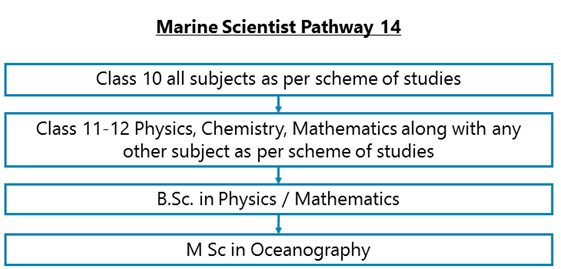
After completing Class 11-12 Physics, Chemistry, and Mathematics along with any other subject as per scheme of studies, you can go for B Sc in Physics/ Mathematics with either of them as a compulsory subject. Then pursue M Sc in Oceanography. You may go for higher Doctoral studies (PhD) too after your post-graduation.
Required Qualification & Competencies
1. To get into this field, you will need to pass Class 11-12 with any combination of Physics, Chemistry, Mathematics, and/ or Biology along with any other subject as per scheme of studies.
2. Your graduation degree can belong to any of Natural or Applied sciences/ Life Sciences / Atmospheric Sciences/ Environmental Sciences/ Geology etc.
3. Then you can do a post-graduation in any one of the following fields or Marine Sciences or any other related field. Master’s degree is a must in this field as most Scientist level industrial roles require post-graduation at the least.
You can study for a Bachelor’s or Master’s or Doctoral degree in any of the following fields (Note that all these fields may not offer you a degree at all 3 levels that is in Bachelor’s, Master’s and Doctoral. Some fields may offer a degree only at the Master’s or at the Doctoral level):
1. Atmospheric Sciences
2. Chemical Oceanography
3. Chemical Sciences
4. Geology
5. Life Sciences
6. Marine & Offshore Engineering
7. Marine and Coastal Systems
8. Marine Biology
9. Marine Biotechnology
10. Marine Ecology and Conservation
11. Marine Engineering
12. Marine Geology
13. Marine Geophysics
14. Marine Life Sciences
15. Marine Resource Management
16. Marine Sciences
17. Marine Zoology
18. Mathematics
19. Physical Oceanography
20. Physical Sciences
Compentencies Required
Interests
1. You should have interests for Investigative Occupations. Investigative occupations involve working with ideas and quite a lot of thinking, often abstract or conceptual thinking. These involve learning about facts and figures; involve the use of data analysis, assessment of situations, decision making and problem-solving.
2. You should have interests for Realistic Occupations. Realistic occupations often involve physical activities for getting things done using various tools and equipment.
Knowledge
1. You should have knowledge of Biological Sciences –Knowledge of plants and animals, their anatomical structure, cell structure, tissues, physiological functions, evolution, and all other related aspects.
2. You may need knowledge of analytical or scientific software such as ADMS pollution modeling software CAP88-PC, CERC EMIT, Chemicals and Irrigation CANDI, DQO ELIPGRID-PC, Ecotech Win Collect, Lakes Environmental Eco Risk View/ Environmental ISC-AERMOD View/ Environmental SLAB View, Link Microtek etc.; compliance software such as EcotechWinAQMS, Emissions tracking software, Material safety data sheet MSDS software, MIRS Compliance; data base user interface & query software such as EarthSoftEQuIS Geology; Smart Data Solutions RS Solutions; Tucows Chem Base; Waters e Lab Notebook etc.
Skills
1. You should have Scientific Skills - using various scientific rules and methods to get things done or solve problems.
2. You should have Technical Skills - using various technologies and technical methods to get things done or solve problems.
3. You should have Critical Thinking skills- Skills in the analysis of complex situations, using logic and reasoning to understand the situations and take appropriate actions or make interpretations and inferences.
4. You should have Judgment and Decision Making Skills - considering pros and cons of various decision alternatives; considering costs and benefits; taking appropriate and suitable decisions.
5. You should have Problem Solving Skills - Skills in analysis and understanding of problems, evaluating various options to solve the problems and using the best option to solve the problems.
6. You should have experience working independently under general direction within the scope of an assignment and use sound judgment in determining methods, techniques, and evaluation criteria.
7. You should have enough verbal and written communication skills necessary to effectively collaborate in a team environment and present technical ideas/results.
Ability
1. You should have Deductive Reasoning Ability - apply general rules and common logic to specific problems to produce answers that are logical and make sense. For example, understanding the reasons behind an event or a situation using general rules and common logic.
2. You should have Problem Sensitivity - The ability to tell when something is wrong or is likely to go wrong. It does not involve solving the problem, only recognizing there is a problem.
3. You should have Inductive Reasoning Ability - to combine pieces of information from various sources, concepts, and theories to form general rules or conclusions. For example, analyzing various events or situations to come out with a set of rules or conclusions.
4. You should have Information Ordering Ability - to arrange things or actions in a certain order or pattern according to a specific rule or set of rules (e.g., patterns of numbers, letters, words, pictures, mathematical operations).
5. You should have Oral Comprehension Ability - listen to and understand information and ideas presented through spoken words and sentences.
6. You should have Oral Expression Ability - communicate information and ideas in speaking so others will understand.
7. You should have Fluency of Ideas - The ability to come up with several ideas about a topic (the number of ideas is important, not their quality, correctness, or creativity).
Personality Traits
1. You are always or mostly careful about your actions and behavior.
2. You are always or mostly disciplined in your actions and behavior.
3. You are always calm or generally remain calm in most situations.
4. You can always act independently or could do so in most situations.
5. You are always imaginative or in most situations.
Career - Job Opportunities & Profiles
After a Master’s degree, you may get roles as a Doctoral Fellow while doing a Ph.D. in a university or research centre or as a Research Associate.
After a Ph.D. you may get roles as a Post-Doctoral Fellow or as a Research Scientist/ Scientist E or similar roles in a research institution or university research centre.
In university departments and medical colleges, you may get roles as an Assistant Professor after Ph.D.
In other organizations/companies, you may get opportunities mostly after post-graduation or a Ph.D. as a Scientist or after a Post-Doctoral Fellowship as a Scientist.
1. You may work with research organizations/ institutions exploring marine natural products, drugs, flora, fauna, underwater physical processes or related areas primarily as research personnel.
2. You may work with biopharmaceuticals companies/drug manufacturers focused on marine drugs or associated derivatives from marine life.
3. You may work as researchers/ educators/ teachers in Educational institutions, universities offering academic programs to aspiring students.
4. You may work with government departments such as in Geological Survey of India; Oil and Natural Gas Commission (ONGC); National Institute of Oceanography, (NIO); National Institute of ocean Technology (NIOT); Central Ground Water Board (CGWB); State Mines and Geology Departments.
5. You may get opportunities in biotechnological industries such as in fields like production of seafood and other foodstuffs.
6. You may work with national/ international non-governmental organizations such as Worldwide Fund for Nature (WWF), Project AWARE Foundation, International Union for Conservation of Nature (IUCN) or others as Program Officers or similar roles.
7. You may work with consultancies conducting industry forecasting & modeling through primary and secondary market research to determine accurate market descriptions & trends. Typically, analysts specialize in researching about the broad development of the market specific to individual players. The most prominent segment in this case would be marine biotechnology.
8. You can also work as officers/scientists at national level research organizations, consultants in national and overseas industries/research organizations and entrepreneurs. There is ample scope for joining private companies that produce feed, seed and accessories for aquaculture and ornamental fish farming. You can also join higher positions in the departments of Fisheries and in Banks as Agricultural Officers.
9. Marine Biotechnology can especially enable you to become a product developer, principal engineer, researcher, company manager, entrepreneur or public administrator. You will be qualified for management-level jobs in the expanding & innovative commercial biotechnology sector.
10. Some selected institutes such as National Institute of Oceanology, Goa; Central Drug Research Institute, Lucknow; Bose Institute, Kolkata; Central Institute of Fisheries Education, Mumbai; Regional Research Laboratory, Bhubaneswar of Council for Scientific and Industrial Research are presently working for exploration of life-saving drugs from marine sources (marine pharmacology/ aqua medicine). Many other pharmaceutical companies have also made significant contributions to this field.
Specialisation Tracks In This Career
Marine Scientist (Marine/ Aquatic Biology)
Aquatic Biologists are concerned with the exploration of the diversity of marine life from coastal margins to the deep sea to attain a deep understanding of the biology of marine organisms ranging from microbes found on coral reefs, the physiology & behavior of marine vertebrates/ non-vertebrates, the biology of marine algae along with a vast majority of other marine life forms. They may conduct field explorations to study the behavior of sperm whales, run their own underwater experiments, examine the diet of gray seals or assess the diversity of marine birds! They use various research methods, like gathering live samples and collecting and assessing data.
Marine Biotechnologist
Marine Biotechnologists focus on innovation, commercial development and value creation of marine resources in processes and industry. Their objective is exploitation of bio-resources including sources of unique biomolecules (enzymes, secondary metabolites, proteins/peptides, marine fats & carbohydrates), associated genetic information with emphasis on use of bioactive compounds and gene products. They are skilled in basic molecular biology, chemistry & techniques/ processes that use marine micro-organisms, plant & animal cells, or parts of these, to manufacture, develop or modify commercially useful products such as food additives, biochemicals/ bioactives and medicinal components etc. They use research methods like DNA barcoding, microscopical imaging techniques, organic synthesis etc.
Marine Scientist (Coastal Development)
Coastal areas are some of the most productive and biologically diverse on the planet. But some of the most beautiful coastlines are disappearing under concrete today. Marine Scientists may work towards better protection, conservation, rehabilitation, management, and policy design of coasts to promote integrated & sustainable management of coastal and marine environment through scientific research & knowledge management for the benefit and well-beingof current & future generations. This is achieved through activities includingcoastal vulnerability assessment, environmental monitoring, mapping coastal land use/ land cover, numerical modeling of near-coastal processes, monitoring specific project sites, assessing tourism/ beach carrying capacity of islands/ coastal areas, preparing coastal regulation zone maps etc. Coasts Scientists may also advise governments & associated stakeholders on policy and scientific matters relating to coastal management.
Marine Chemist
The chemical composition of water in aquatic ecosystems is influenced by natural characteristics and processes including precipitation, underlying soil and bedrock in the watershed, erosion, evaporation, and sedimentation. Biological reactions also affect the chemical properties of water. Additionally, human activities also influence the chemical composition of aquatic systems and their water quality. Marine Chemists study chemical properties of water samples from seas, oceans, lakes etc. and its changes, geochemical cycles, ocean acidification, increase/decrease of water pH/ oxygen levels, calcium deposits in skeletons of marine animals, chemical changes in the hydro environment affecting planktonic organisms including pteropods, coccolithophorids and foraminifera which are all very important in the food chain.
Marine Ecologist & Conservationist
Marine Ecologists are proficient in the scientific study of marine-life habitat, populations, and interactions among organisms & the surrounding environment including their abiotic and biotic factors. Abiotic factors refer to the non-living physical & chemical factors which affect the survival and reproductive abilities of marine organisms. Biotic factors are the directly/ indirectly affecting living things or the materials in the environment of an organism. They study of marine ecosystems and the biosphere. They make observations at the biochemical, cellular, individual, and community levels. The impact of human activity such as medical research, development, agriculture, fisheries, and forestry is also studied by Marine Ecologists and Conservationists. Such analyses make this sub-specialty more complex compared to studying the insides of anorganism because of the numerous interconnections, symbiotic relationships, and influence of many factors.
Marine Microbiologist
Marine Microbiologists use tools to better understand the marine microbial life and the matter in which it affects our biosphere. They deal with many aspects of marine microbial communities such as the marine pelagic food web, harmful algal blooms, geomicrobiology and processes in the sea floor and in oil reservoirs, arctic microbiology, and the role of microorganisms in climate change. They study major groups of prokaryotic microorganisms (bacteria and Archea) and viruses, their taxonomy, their biological characteristics/ habitats, single-cell interactions, mixed communities, physiology and genetics / molecular biology. Energy metabolism, regulation, gene transfer and microbial diversity / evolution are their central tenets.
Marine Pharmacologist
Marine Pharmacologists study aquatic organisms and screen them for antibacterial, immunomodulation, anti-fungal, anti-inflammatory, anticancer, antimicrobial, neuroprotective, analgesic, or antimalarial properties. They are used in new drug developments. Research into the pharmacology of marine organisms is limited, and most of it remains unexplored. Development of new formulations using marine derivatives has an advantage of abundance in nature and large scale production. At present, the drugs industry is working on screening and isolation of novel molecules with unreported pharmacological properties that can be exploited for the development of new therapeutic agents for commercial use.
Marine Geologist
Marine Geologists are trained in studies of the origin & evolution of the global oceans, the history of the earth’s climate, the earth’s natural resources and their exploitation. Marine Geologists study the formations, composition, history of seafloor, marine sediments, their physical & chemical characteristics, including sediment origin, distribution and age. By combining their knowledge of marine chemistry & physical oceanography, they obtain information about the dynamics of the Earth and how the movement of plates/ continents results in volcanoes or earthquakes. Marine geologists also work with biologists and chemical oceanographers to study historical climate records and animal/ plant life by examining sediment and rock cores for fossils and analyzing sediment composition using radiocarbon dating and other methods.
Marine Scientist (Aquamedicine and Aquaculture)
Aquamedicine Experts or Aqua Medicine Biologists learn the biology of aquatic organisms, pathogens, and the impact of environmental factors, i.e. conditions that can lead to the development of illness and injury in order to provide primary aquatic animal health service for the prevention and treatment of illness and injuries in aquatic organisms. They work in the aquaculture industry, aquatic animal health services, and educational and research institutions. They also study organization and legislation related to fish farming which is the most consumed aquatic organism today. Aqua medicines can be herbal extracts for fish growth/ promotion, as an aqua feed/ dietary supplement, probiotics, beneficial bacterial supplements, hormone supplements, liver tonic premixes or they can be treatments for animal skin diseases, kidney diseases or ulcers etc.
Career Growth
If you are part of any government research institution/ university research centre, you will typically progress as Research Scholar, Scientist B, Scientist C, Scientist D, Scientist E, Scientist F, Scientist G, Scientist H or Outstanding Scientist, Distinguished Scientist (DS), Secretary, Chairman, Deputy Director-General, Director-General. Some independent institutions like
In industries, generally, it is:
Scientist – Senior Scientist – Principal or Lead Scientist – Vice President – President / Chief Scientific Officer / Executive Director
Or
Research Executive – Senior Research Executive – Research Manager – Senior Manager Research – AVP – VP – Chief Research Officer/ Chief Scientific Officer / Research Director/ etc.
Salary Offered
After a Master’s degree, stipend in India while doing PhD is about Rs. 35,000-38,000 a month in a university or research centre or as a Research Associate with a salary of about Rs. 15,000-20,000 a month.
After a Ph.D., stipend for Post-Doctoral Fellows is Rs. 40,000-45,000 a month or as a Research Scientist/ Scientist E or similar positions in a research institution or university research centre you will be remunerated according to the following.
The emoluments of Scientists as per the 7th Central Pay Commission in India are given below. The minimum qualification required for entry-level positions is a Master's degree or post-graduation. These are all monthly initial pays in INR. Initial pay increases as an individual grows through ranks and pay bands in each level.
1. Scientist 'B' (Level 10): 56,100/-
2. Scientist 'C' (Level 11): 67,700/-
3. Scientist 'D' (Level 12): 78,800/-
4. Scientist 'E' (Level 13): 1,23,100/-
5. Scientist 'F' (Level 13A): 1,31,100/-
6. Scientist 'G' (Level 14): 1,44,200/-
7. Scientist 'H' / Outstanding Scientist (Level 15): 1,82,200/-
8. Distinguished Scientist(Level 16): 2,05,400/-
9. Secretary / Chairman(Level 17): 2,25,000/-
In other organizations/companies mostly after a Ph.D. as a Scientist or after a Post-Doctoral Fellowship as a Scientist, salaries in India may vary between Rs. 70,000-1,50,000 a month or even more. Some opportunities do exist as a RA after Master’s. Salary would be about Rs. 25,000-35,000 a month.
The monthly salaries of faculty approved by the Ministry of HRD (Department of Higher Education), Govt. of India are:
1. Assistant Professor Grade-II: Rs 57700 to Rs 117200
2. Assistant Professor Grade I: Rs 101500 to Rs 204700
3. Associate Professor: Rs 139600 to Rs 211300
4. Professor: Rs 144200 to Rs 224100
Monthly Earnings In Indian Rupee
1. Entry level: 0 - 2 years of work experience
2. Junior Level: From 1 to 12 years of work experience
3. Mid-Level: From 5 to 20+ years of work experience
4. Senior Level: From 10 to 25+ years of work experience (there could be exceptions in some high-end technical, financial, engineering, creative, management, sports, and other careers; also in the near future, people will reach these levels much faster in many careers and in some careers, these levels will have no meaning as those careers will be completely tech skill driven such as even now, there is almost no level in a Cyber Security Expert’s job)
Work Activities
1. Analyzing and interpreting data and information - Analysis of data and information to find facts, trends, reasons behind situations, etc.; interpretation of data to aid in decision making.
2. Communicating with co-workers and others - Communicating with people in writing, verbally or otherwise inside your workplace and various other people who have professional relationships with your place of work including vendors, government officials, etc. or with people at large.
3. Creative thinking - Developing new ideas, concepts, innovative solutions to problems, newer ways of getting things done, designing products and services, creating work of art and craft, etc.
4. Getting Information and learning - Observing, hearing, reading, using computers, or otherwise obtaining information and learning from it.
5. Identifying objects, actions, and events - Identifying various characteristics of objects; observing and understanding actions and events; understanding changes in actions and events.
6. Inspecting equipment, systems, structures, and materials - Inspecting equipment, systems, structures, and materials to ascertain quality, performance, defects, causes of errors, etc.
7. Making decisions and solving problems - Analysis of data and information; evaluation of alternative decisions and results of decisions; taking the right decisions and solving problems.
8. Monitoring processes, systems and performance - Observing and recording information on processes and systems; monitoring progress of projects and tasks.
9. Organising, planning and prioritizing tasks - Planning and organising tasks in order to achieve work goals; prioritizing tasks to achieve goals and making the best use of the time available.
10. Operating machines, equipment, devices, systems and processes - Using various methods and techniques to operate machines, equipment, devices, systems and processes in industrial and other settings.
11. Processing information - Compiling, tabulating, calculating, auditing, verifying or otherwise dealing with information processing including data entry, transcription, recording, storing and maintaining databases.
12. Strategic planning - Developing visions and goals, developing strategies and action plans for achieving visions and goals.
13. Updating and using relevant knowledge - Keeping updated with the latest knowledge relevant to your fields of work and use of the relevant knowledge in getting things done.
14. Using computers for work - Using computers for day-to-day office work; using computer software for various applications in day-to-day professional work; entering data and process information; for writing.
15. Working in a team - Working in a team of people; developing team; maintaining professional relationships among team members.
Future Prospects
1. The future of this pathway seems promising as the industry statistics are encouraging. The Marine Biotechnology Market worldwide is projected to grow by USD 3.2 billion, driven by a CAGR (Compounded Annual Growth Rate) of 9.2% to reach over USD 3.1 billion by the year 2025. Within Europe, Germany will add over USD 107.4 million in the next 5 - 6 years. Over USD 92.2 million worth of projected demand in the region will come from the rest of the European markets.
2. In Japan, Bio Active Substances will reach a market size of USD 146.2 million by the close of 2025. China exhibits the potential to grow at 13.7% over the next couple of years and add approximately USD 913.6 million.
3. The Global Marine Pharmaceuticals Market is to grow at a CAGR (Compounded Annual Growth Rate) of 7.28%. The Marine Collagen Market was valued at USD 819.299 million in 2018 and is projected to expand at a compounded rate of 5.59% from 2019 to 2024 to reach USD 1.135 billion by 2024. Collagen is the collagen obtained from fish and other marine organisms. It’s used as a food supplement, in biomedical applications and in the cosmetic and healthcare industry.
4. The Environment Cleanup & Remediation Market is projected to grow to nearly USD 130 billion. The Global Marine Mining Market is expected to grow at a CAGR of 30% during 2018-2024.
5. The Fish Processing Market is projected to reach USD 222.71 billion in terms of value, at a CAGR of 3.8%. Based on application, the fish processing market is classified into food and non-food applications such as fish meal, fish oil, cosmetics, fertilizers, and other industrial uses. The non-food processing application segment was the fastest-growing segment, growing at a rapid rate.
Future Prospects At a Glance


